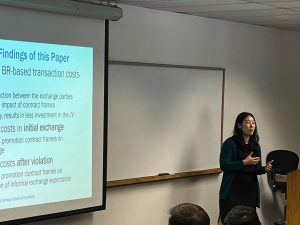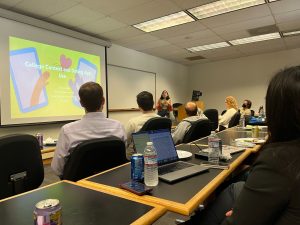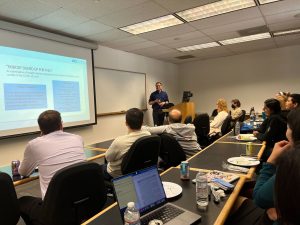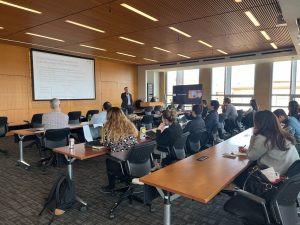Celebrating 20 years of COR and hearing about exciting research conducted by the 2022 COR Small Grants recipients!



by skoppman
Celebrating 20 years of COR and hearing about exciting research conducted by the 2022 COR Small Grants recipients!



by skoppman

SPEAKER: Oliver Hahl, Associate Professor of Organization Theory, Strategy, and Entrepreneurship, Tepper School of Business, Carnegie Mellon University
DATE AND TIME: Friday, February 17, 2023 at 10:30 AM – 12:00 PM PST
LOCATION: SB1 5200 (Lyman Porter Colloquia Room); Zoom link available on request
TITLE: “Learning Like A Pro: Evidence of Differential Learning from Industry Accidents by Individuals Within Organizations”
TALK ABSTRACT: Research on learning from failure has found that industry accidents can inspire organizations to learn, or improve performance, vicariously from other firms’ failures, but also that they soon forget what they have learned, regressing back to old patterns. This research, at the organizational level, obscures the fact that individuals inside of organizations might approach these opportunities to learn differently. We argue that an important difference between individual workers that can affect learning patterns is their level of professionalism, or the extent to which one is trained and/or identifies with one’s profession. This distinction allows us to explain why those more threatened by an accident caused by negligence (those with less professionalism) react more strongly to the accident, driving the observed organizational patterns. What is more, we argue that the patterns that look like learning at the organizational level are not actual learning because these less-professional workers a) cannot sustain the change in behaviors after the accident and b) tend to engage in more superficial learning behaviors induced by institutional pressures reacting to the large-scale accident. As a result when institutional pressures wane, the positive change in behavior drops, explaining the forgetting patterns found at the organizational level. Through analyses of behavior in the context of a large-scale accident in the maritime industry, we find support for this argument and highlight the value of understanding learning patterns at the microfoundational level. By extending theory to the individual level we can explain organizational level patterns in more detail and highlight how professionalism shapes learning behaviors for individuals within firms ultimately shaping organizational performance.
SPEAKER BIO: Oliver Hahl is an Associate Professor of Organization Theory, Strategy, and Entrepreneurship at the Tepper School of Business, Carnegie Mellon University. His work seeks to understand the microfoundations and sociological underpinnings of organizational phenomena at the interfirm, intrafirm, and market levels. His research interests revolve primarily around organizational and individual identities in markets and the potential benefits and constraints of success, authenticity, and status.
by skoppman
LOCATION: SB1 5100(Corporate Partners Executive Boardroom)
TITLE: “Coping with a pandemic: Unpacking the underlying dynamics of entrepreneurs’ resilience”
TALK ABSTRACT: We develop a model of the longitudinal unfolding of entrepreneurs’ experience of distress and their subsequent mobilization of relevant coping strategies, which we test with a five-wave survey of 574 entrepreneurs at the onset of the COVID-19 pandemic. We theorize and show that the more emotionally-exhausted entrepreneurs are at the crisis’ beginning, the more uncertainty they later perceive about their resources, and the more this hinders their subsequent mobilization of relevant coping strategies – namely, environmental scanning and reflexivity. In turn, we theorize and show that for environmental scanning to reap benefits in terms of reduced perceived uncertainty and emotional exhaustion, it must be accompanied by deliberate efforts in reflexivity. All in all, our work contributes new insights about the underlying psychological dynamics that explain the mobilization of relevant coping strategies – and of the effects these can have for becoming resilient.
SPEAKER BIO: Jean-François Harvey is an associate professor in the Department of Entrepreneurship and Innovation at HEC Montréal. His research focuses on how individuals, teams, and organizations learn and adapt, especially in uncertain and ambiguous contexts. His work has appeared in scholarly journals such as Academy of Management Annals and Human Relations, and his book (with Amy Edmondson), Extreme Teaming, reports the findings of a multiple case study on this topic. Harvey received his Ph.D. from HEC Montréal, was a visiting scholar at the University of California, Berkeley, and completed a two-year postdoc at Harvard Business School.
by skoppman
DATE AND TIME: Friday, October 21, 2022 at 10:30 AM – 12:00 PM PDT
LOCATION: SB1 5100 (Corporate Partners Executive Boardroom); Zoom link available on request
TITLE: “Frontline Professionals in the Wake of Social Media Scrutiny: Examining the Processes of Obscured Professional Accountability”
TALK ABSTRACT: Professional accountability is considered important to the sustenance of a profession. Prior research has examined the role that scrutiny by constituents, such as supervisors, regulators, auditors, and certification bodies, plays in improving professional accountability. With the advent of social media, a dispersed, diverse, and pseudonymous public can now scrutinize the actions of professionals, especially those at the frontline. In this research, I examine how social media scrutiny from the public impacts the professional accountability of frontline professionals and the consequences to the work of downstream professionals in the ecosystem. Based on an ethnography of 911 emergency management, I find that social media scrutiny of 911 call-takers—the frontline professionals in this setting—can obscure rather than improve professional accountability. I elaborate on the processes that produce these paradoxical outcomes and discuss their theoretical significance. Specifically, I unpack how and why social media scrutiny pushes frontline professionals to deviate from their professional mandate, which, in turn, obscures their sense of professional accountability. Beyond the frontline professionals, these processes also negatively affect the everyday work of downstream professionals (e.g., 911 dispatchers, police officers) in the professional ecosystem, thereby producing a cascading set of unintended consequences for multiple actors across the ecosystem.
SPEAKER BIO: Arvind Karunakaran is an Assistant Professor of Management Science & Engineering at Stanford University. His research examines authority and accountability at work in the context of technological change. Drawing on organizational theory and the sociology of work & professions, his current research focuses on the mechanisms and processes for holding professional groups accountable for their actions, especially during periods of change. He received his Ph.D. from MIT Sloan School of Management, and his research is published in Administrative Science Quarterly, Organization Science, and Research Policy.